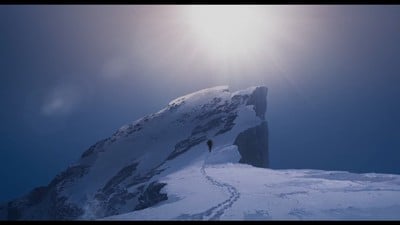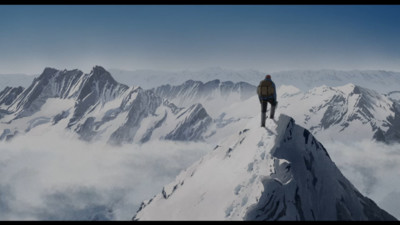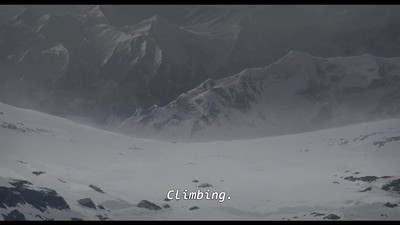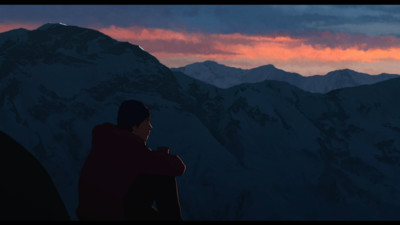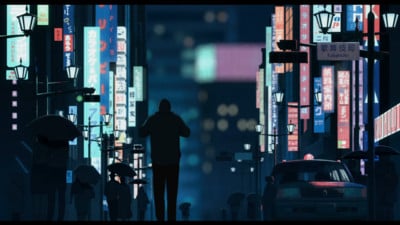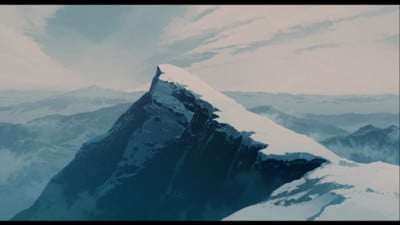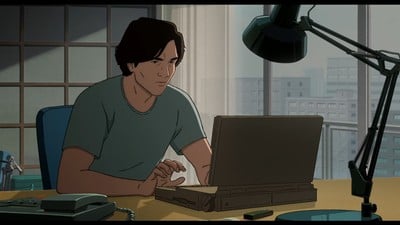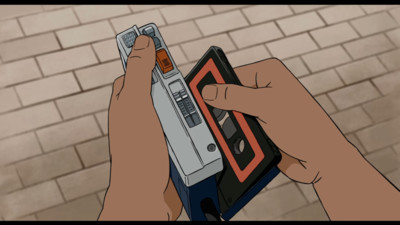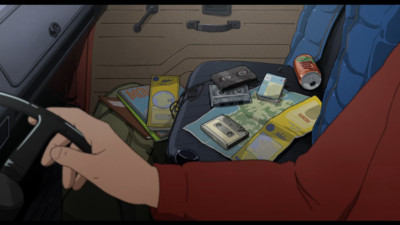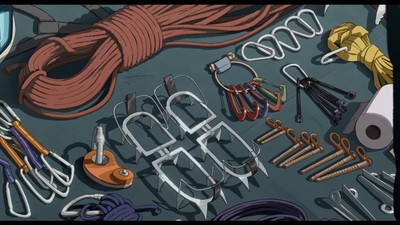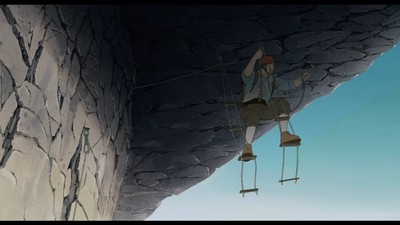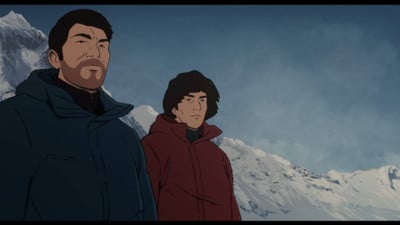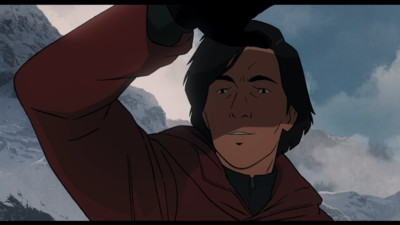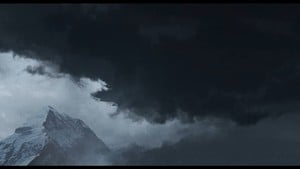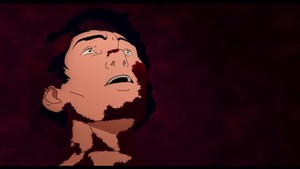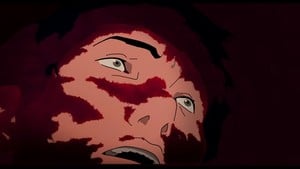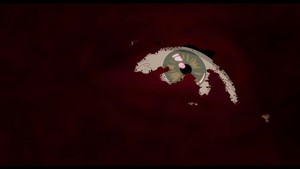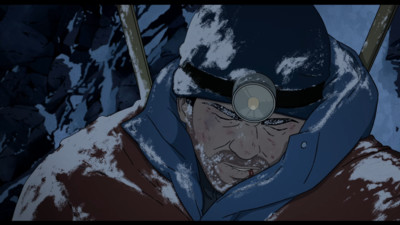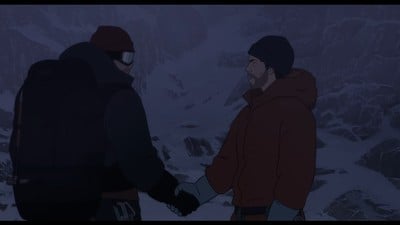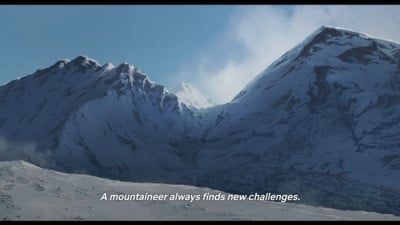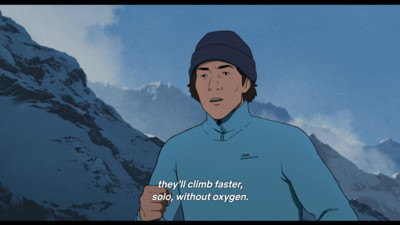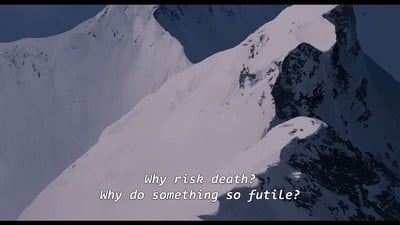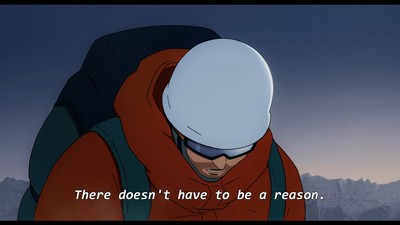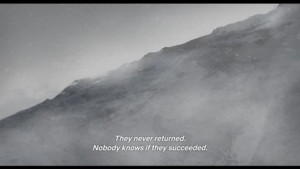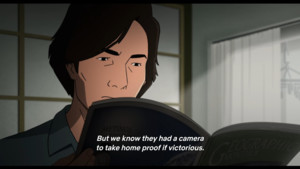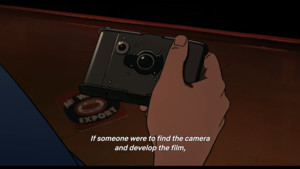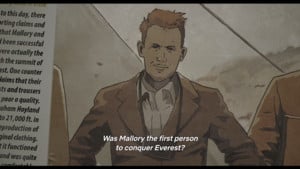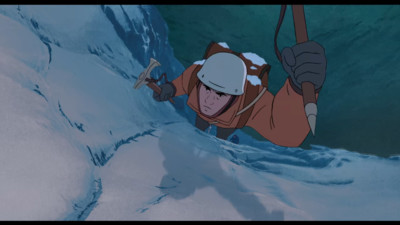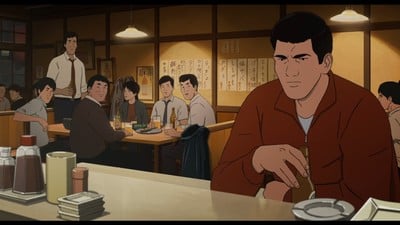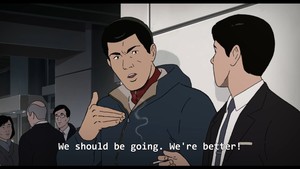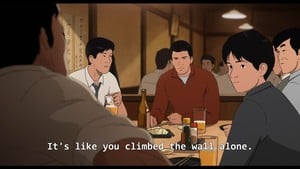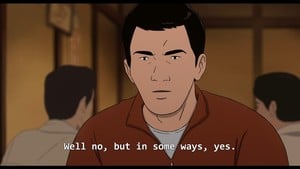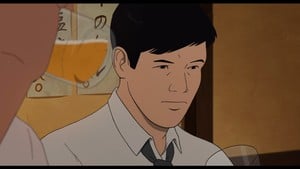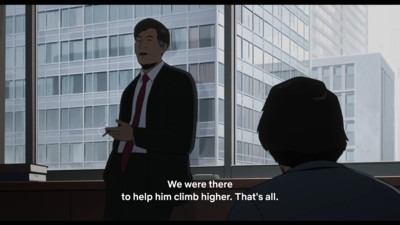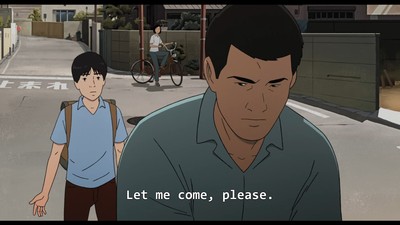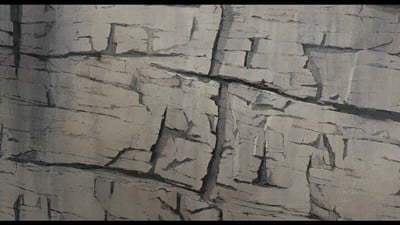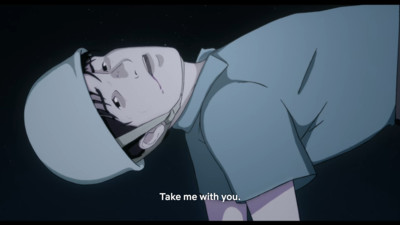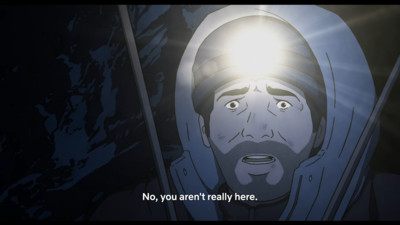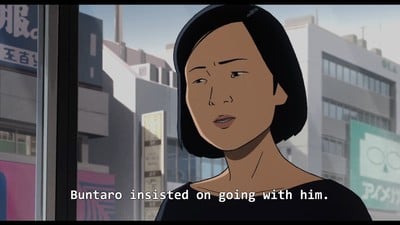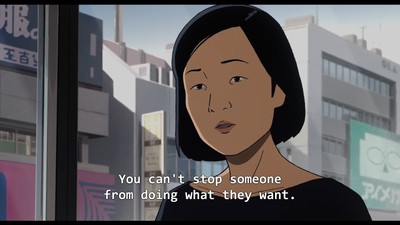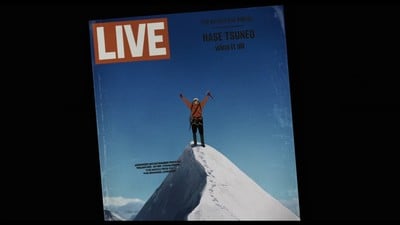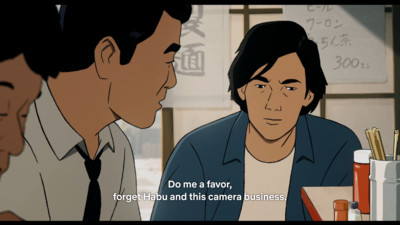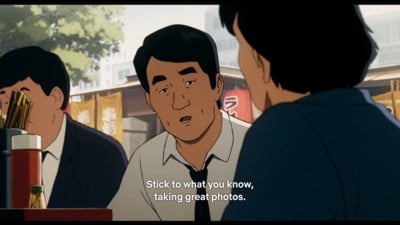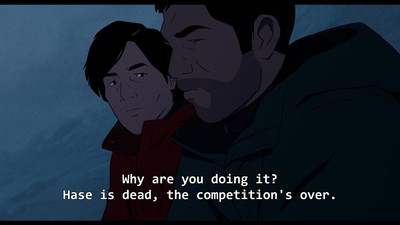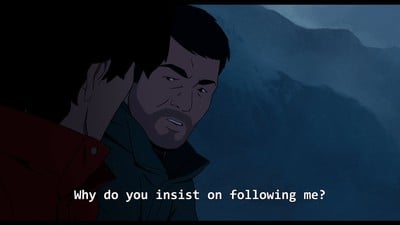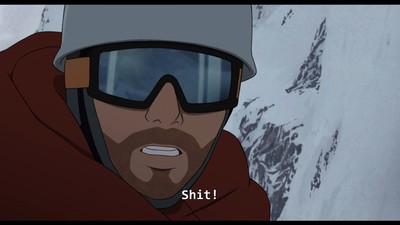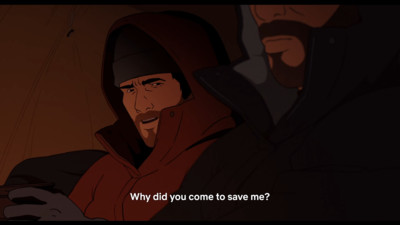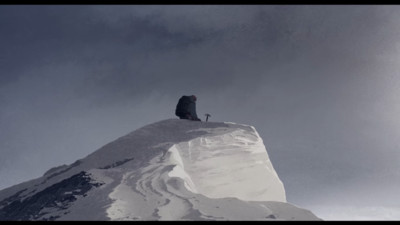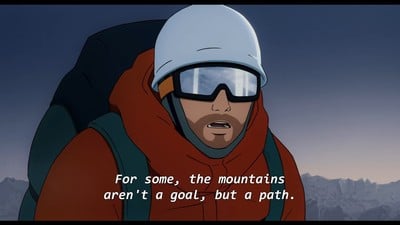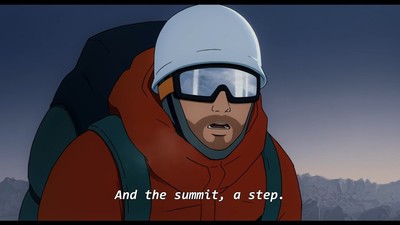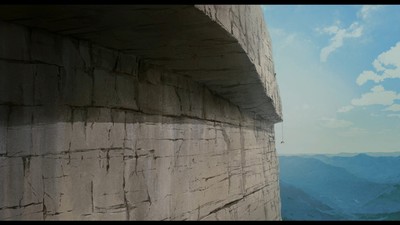The French-animated adaptation of Jiro Taniguchi's climbing manga follows two men obsessed with Mt. Everest: a mountaineer and a journalist seeking to discover what happened to a lost expedition. Together they'll face the unrelenting brutality of one of Earth's highest peaks in this beautifully animated drama.
This movie is streaming on Netflix
You can read our full length review of the film here and an interview with the director here.
Disclaimer: The views and opinions expressed by the participants in this chatlog are not the views of Anime News Network.
Spoiler Warning for discussion of the film ahead.
Steve
Bonjour Nicky et bienvenue dans "Cette Semaine en Animation Française!"
TL Note: That's French for “are you ready to get high?”

Nicky
Steve, spare me, I can barely speak Spanish. But while romance languages aren't my strong suit, there's some languages that speak for themselves. One of those being animation. It's highly accessible. Just look for yourself and hear the beauty of the wind as it braces against cold hard rock. This week, we're translating The Summit of the Gods.

Let me assure you, any French that comes out of my mouth or keyboard is arriving via an overtaxed Google AI. But I wanted to mark the occasion anyway, because it is rare that we find reason to watch a French language film for this column. In this case, though, it's based on Jiro Taniguchi's manga adaptation of Baku Yumemakura's novel about the allure and pitfalls of climbing very tall rocks, so we're good. You can't yell at us.

Not anime per se, but they do know a thing or two about animation in other countries.
The French are no strangers to animation and comics. They're rather big consumers of manga and we've already had several Franco-anime co-pros so it's not actually that out there. And like the times when we have reviewed animation outside of Japan or other related adaptions, it's less about delineating or defining pieces of this big medium, but how we think anime fans or even non-anime fans might feel approaching them.

After all, the big world of art, film, and animation can sometimes feel super intimidating! So consider us your guides as we travel through them.
It's not a good animated movie unless you put some real love into those backgrounds. They have this particular thick watercolor quality/paper texture and some shots are even made to look closer to a traditional camera. It's highly appropriate given that the original novel came out in 1998. But it has this added effect of making everything feel more real but distant as things begin to wash out and fade. It adds a real sense of scale, whether it's the city lights or the lower mountain ranges from the peak's top.


Strewn throughout, there are other very subtle hints that this doesn't take place in the present day. See if you can spot this one!


Why, back in the old days, they had to make their collaborative anime discussion columns by emailing a .txt file back and forth. We don't know how lucky we've got it.
There's also some great love for analogue tech like these cassette tapes. The sound mixing of the little clicks and clacks these technologies make really bolsters it.


Yeah I think "immersive" gets thrown around too much as a buzzword when it comes to big event movies, but
Summit puts in the work to earn that adjective. Both in the daily minutiae on the ground and in the knuckle-whitening ascents to the top. My palms were sweating at multiple points while watching this, thanks to the artistry, meticulous sound design, and attention paid to the tech and techniques of mountain climbing.


Man I'm sweating again just looking at that second image.
It's an extremely grounded film that captures the real dangers of this sport. Normally, I feel like most people would expect this story about a climbing photographer and journalist trying to track down a lead to be easier to translate to live-action, and Jiro Taniguchi's manga already had that in 2016. But while Taniguchi's style leans towards realism, there's a real distinctive quality to his art and faces that I think this film captures well, even when people are talking. There's a lot of facial mannerisms you wouldn't pick up on as much on a real actor.


But also, this film displays many real beautiful and notoriously difficult mountains that are pretty dangerous to film on. I don't think the studio picked up this story simply because animation is cheaper and safer for certain locations. It just brings you into the moment a lot easier than what's possible for live-action.
Oh yeah, this film is super haunting in more ways than one. While tied to Fukamachi's investigation of Habu and their personal lives, it's not without it's moments of existentialism. There's the quiet isolating experience of being alone with nature, the terrifying feeling of literally being one slip away from your own death, or the extreme weight of grief that Habu faces throughout the film. Even just watching someone wait to freeze to death is such a slow but thrilling experience.

Part of what really sold me is the soundtrack. While the climbers make their ascent you can really feel the tension in the strings as some of the climbers hold onto dear life with only pieces of rope. There's many humming synths for the cityscapes, or the clattering of drums while both Habu and Fukamachi pack up their respective equipment for the road, or the gawping sound of a deep cavern. Lots of clever emphasis via the instrumentation!
I think my most pleasant surprise was the way the story ended up being structured. Based on the trailer, I expected it to focus on Habu and Fukumachi's Everest attempt, but that only takes up the third act. The film as a whole is actually a patient, melancholic character study of its two leads and the parallel ways they each live and suffer for their obsessions. There's some thematic meat on those bones, and I like it!

Yeah, the focus on mountain climbers specifically being tied to their obsessions reminded me a lot of Jon Krakauer's
Into Thin Air. Specifically, for mountaineers, there's some truth to it. Many live for danger, the competition, or the majestic elements of it.


Basically, I realized mountaineering is actually just what sporty people do instead of speedrunning Mario games.
On the sincere side of things, I can't say that I don't relate as someone who's totally tied to their obsession with animation.
That's the exact beauty of
Summit! By tying so many threads between Habu's superhuman athletic feats and Fukamachi's more quotidian journalistic pursuit, it reinforces that it's not just about mountains. It's about the mountains we all try to climb for one reason or the other, even as we confront our own insignificance compared to the scope of our pursuits, let alone the scope of the universe itself. It's all about that Sisyphean absurdity that I've been rotating in my mind ever since Sonny Boy broached the same topic.


And I love how Mallory doesn't matter a bit to Fukamachi by the end of it. That question started this whole journey for him, yet once he gets his answer, he doesn't even bother telling the audience about it. Whether we know he did it or not has no bearing on Mallory's achievement or lack thereof. It's a complete 180 from Fukamachi, but it follows his character arc in a very satisfying way.
Incidentally, I don't think I ever thought much about how the conditions on top of Everest would almost perfectly preserve most of the climbers who fall victim to it. That is hella gnarly.

They also did actually find Mallory's body for real a year after the original novel was published. Go figure.
That's great and also horrifying to know. I can always count on you, Steve.
Look if watching a cartoon was enough to give me the cold sweats, then the least I can do is pass them along to my friends and readers.
I don't even get vertigo! The stuff in this film is just that raw.

But I think the real centerpiece character of the film is Habu Joji. Seen above. He's a talented, fearless, and reckless athlete who doesn't quit on his ambitions even when he really should.

He's also a lot of fun at parties.

"Yeah, I would kill my (climbing) partner if it meant reaching my own goals. What's the big deal about that?" Great casual conversation, Habu.
Clearly not a metaphor about a man who struggles with interpersonal relationships.
Yeah, it's noted that he constantly disregards his climbing partners. He's selfish and only cares about his own accomplishments. He uses others to climb higher but he still thinks of them as a burden and a liability. Here's his ex-partner talking to Fukamachi, years later.

Still not as bad as The Worst Decision Ever.

This kid is like 12 years old, he should be climbing a jungle gym, not this.

And obviously that goes about how'd you expect. With Habu feeling extremely responsible after. He let this lad who isn't nearly experienced enough to keep up follow him. In a way, that made him feel extremely inadequate, until he had felt like he had no choice but to cut his own rope. It's an event that only fuel's Habu's fears and he begins to only do solo climbs so he would never have to face what happened again.


I also get how his sister's reflections years later tie into the film's thematic webbing, but also, lmao. You absolutely can stop a child from doing what they want. In many cases, it's your responsibility to do that! This is why none of my classmates skipped the entire fifth grade to watch reruns of
Power Rangers instead. Believe me, we would have if we could.


That's one line in the film that speaks more metaphorically to me and not so much for the actual circumstances. Either way, Buntaro committed suicide and it becomes very hard for the living to cope with that, even if their interpretation isn't 100% perfect.
Yeah it's the big turning point for Habu, whose pursuits grow increasingly disastrous. Which also metaphorically ties into the act of mountain climbing itself. Everyone who reaches the top eventually has to make a descent. And I don't know much of anything about conquering the tallest peaks on the planet, but I do know that a lot of people lose their lives on the way down, not just on the way up.

Yeah, and there's no scarier way to die than to simply die alone. Habu's rival, Tsuneo, perished while making a solo climb. Probably the closest person he had to a friend at that point in his life. When Fukamachi finds him Habu has no one. When they're climbing, Habu is always ahead of him while Fukamachi follows. Despite the great risks though, Fukamachi doesn't ever turn back on trying to get closer to Habu. Not when his boss tells him that it's worthless, not when he's frantically following him up the snow, and not even on the brink of death.


I mean the dude literally trains to climb the tallest mountain in the world in order to follow this guy. They are kindred spirits, whether they like it or not.


I also like how, as their climb progresses, the line between the two blurs further, with Fukamachi sporting similar-looking stubble and even finding himself in more or less same situation that cost Habu two of his fingers.

Honestly, if it wasn't for the fact that they have different jackets, I don't think I would've been able to tell them apart at some points.
That's smart filmmaking!
I also like that it's eventually Habu that saves Fukamachi. I expected the other way around. Habu talks a lot about how he didn't want to deal with anyone and how doing so would only kill both of them but he goes out and does it anyways. It feels like a second chance, or a way of atoning.

And the result is just real intimacy.
It's a sign of Habu's maturity too, which ironically runs tandem with an acceptance of his own forthcoming death. Like, a different story would have had Habu go back down with Fukamachi, but Habu presses onward instead, making a more complicated and tragic ending. I think it's the right one for the film too. The death-defying allure of mountain climbing can be found in plenty of stories, but Summit strikes a much more measured tone. You could walk away from this film with an itch to hit a climbing wall, or you could walk away determined to avoid anything steeper than a 30 degree incline. Both reactions are correct.
It's a mesmerizing little moment. You see that Habu totally understands who he is but he also understands that he can't change and you have to just kind of respect him for it. Even this big mountain feels like such a humble triumph in that perspective. He knows there's no salvation for himself but it's satisfying to seem him content.

I love this shot in particular because he's on top of the world yet he still looks a bit defeated. That's good shit.
Because that's ultimately what the film is about. It's not about climbing a single peak, solving a single mystery, mastering a single skill, or anything that neat and simple.


A very open-ended and kind of bittersweet note for this story to end on, but that's how I like my movies.
Yeah, it's a great little film and I'm excited to see if I can make time to catch it in a (very empty) theater permitting everything. But it was still pretty satisfying watching it at home. Plus, I actually watched the English dub after switching tracks a bit and I found it to be pretty good and keeping with the naturalism.
I'm glad I watched it too. Just don't expect to find me anywhere near a sheer rock face anytime soon. I think I've had my fill.

 @Lossthief
@Lossthief
 @mouse_inhouse
@mouse_inhouse
 @NickyEnchilada
@NickyEnchilada
 @vestenet
@vestenet
